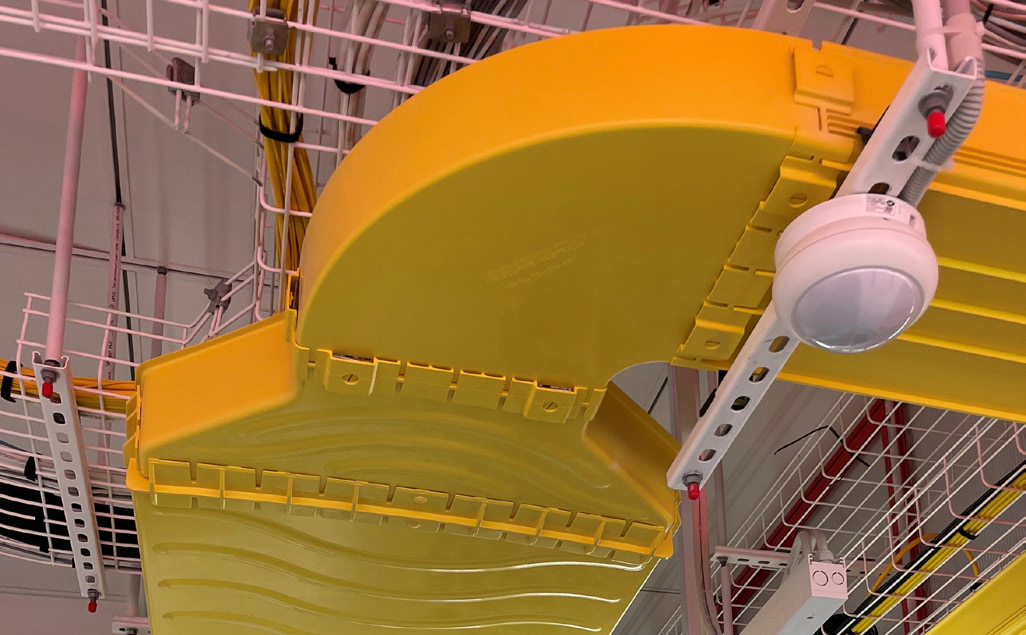August 12, 2025
Involved in deploying or maintaining fibre optic networks? Selecting the right power meter is crucial — particularly with the growing adoption of XGS-PON and Combo-PON technologies. Whether you're testing traditional GPON or the latest XGS-PON networks, mastering wavelength-specific measurements is key to avoiding costly mistakes on site. Since 2023, major telecom operators in France have been progressively rolling out XGS-PON services on their FTTH networks. This technological evolution from GPON (Gigabit Passive Optical Network) to XGS-PON (10 Gigabit Symmetric Passive Optical Network) is made possible through “Combo-PON” cards integrated into active equipment, namely: • Optical Line Terminal (OLT) – located at the network core • Optical Network Terminal (ONT) – installed at the subscriber’s premises OLTs are fitted with blades offering several PON ports, each capable of connecting multiple ONTs. Thanks to wavelength division multiplexing (WDM), a single PON port can manage passive optical trees serving several subscribers via optical splitters. Key Differences Between GPON and XGS-PON : The main driver is the increasing demand for bandwidth and data, requiring higher network throughput. Différences entre GPON et XGS-PON : • GPON technology offers up to 2.5 Gbps downstream and 1.25 Gbps upstream. • XGS-PON technology offers up to 10 Gbps downstream and upstream (Symmetric) . Modern OLTs often support both GPON and XGS-PON simultaneously through Combo-PON blades, easing subscriber migration without the need for a full infrastructure overhaul. Understanding PON, GPON, and XGS-PON GPON XGS - PON Spec GPON XGS – PON XG – PON XGS – PON Wavelength Downstream : 1480 – 1500 nm Downstream : 1575 – 1580 nm Downstream : 1575 – 1580 nm Upstream : 1290 -1330 nm Upstream : 1260 -1280 nm Upstream : 1260 -1280 nm Central Wavelength Downstream : 1480 nm Upstream : 1330 nm Downstream : 1577 nm Upstream : 1270 nm Downstream : 1577 nm Upstream : 1270 nm Max Data Rate Downstream : 2,488 Gb/s Upstream : 1,244 Gb/s Downstream : 9,953 Gb/s Upstream : 2,488 Gb/s Downstream : 9,953 Gb/s Upstream : 9,953 Gb/s Frame Structure GEM (GPON Encapsulation Method ) XGEM (X GPON Encapsulation Method ) XGEM (X GPON Encapsulation Method ) Which Tester for PON Networks: Broadband Optical Power Meter or Selective Power Meter? On PON and GPON networks, measurements are traditionally carried out by using a broadband optical power meter. This type of device measures optical power over a wide range of wavelengths but does not differentiate between specific wavelengths. Broadband power meters are factory-calibrated to measure commonly used wavelengths in PON and GPON networks (1310/1490/1550 nm). The main difference between a broadband power meter and a selective power meter lies in their ability to measure optical light over specific wavelengths. How to Choose the Right Power Meter for the Job For networks where the OLT uses XGS-PON blades transmitting at 1577 nm, a selective power meter is a must. .tg {border-collapse:collapse;border-spacing:0;} .tg td{border-color:black;border-style:solid;border-width:1px;font-family:Arial, sans-serif;font-size:14px; overflow:hidden;padding:10px 5px;word-break:normal;} .tg th{border-color:black;border-style:solid;border-width:1px;font-family:Arial, sans-serif;font-size:14px; font-weight:normal;overflow:hidden;padding:10px 5px;word-break:normal;} .tg .tg-1wig{font-weight:bold;vertical-align:top} .tg .tg-amwm{font-weight:bold;text-align:center;vertical-align:top} .tg .tg-0lax{text-align:left;vertical-align:top} Solution EXFO PPM1C Réf 19472 Viavi OLP - 37XV2 Réf 10090856 Supported Technologies GPON, EPON, XGS-PON, 10G-EPON Simultaneous downstream for G/E-PON (at 1490nm) and XGS-PON/10G-EPON (at 1577 nm) GPON, EPON, XGS-PON, 10G-EPON Automatic detection of the active PON technology thanks to the PON-aware™ feature Interface High-visibility backlit display with contextual keys Intuitive graphical user interface with colour touchscreen Connectivity Low Energy Bluetooth Low Energy Bluetooth Power Supply 2 AA/LR6 alkaline batteries, rechargeable AA NiMH batteries, or mains power adapter Rechargeable, field-replaceable LiPo battery. Up to 10 hours of operation Data Storage 1000 results + PC download 1000 results + Cloud via EXFO Exchange™ Extras 1000 results + Cloud via EXFO Exchange™ Broadband mode + VFL (PRO model) Warranty 3 years 12 months / 3 years calibration See all our Fibre Optic Power Meters Smart tip If you need to activate a GPON customer on a PON network but don’t have a selective power meter — and you’re unsure whether the OLT is fitted with an XGS-PON blade — there is a way to avoid measurement errors: • Use a blocking filter with your broadband power meter. This filter blocks the 1577 nm wavelength specific to XGS-PON, allowing you to take reliable measurements only at traditional PON/GPON wavelengths (1490 nm, 1550 nm). Caution ! Adding this filter introduces additional optical loss. You will need to adjust your power readings accordingly by factoring in the average loss caused by the filter. How to Use SC or LC Reflectors with XGS-PON? Field Technician FAQ Are broadband power meters obsolete? No ! They remain essential for versatile use cases beyond FTTH — such as testing passive networks, private links, multimode fibre, or singlemode networks not migrating to XGS-PON. Can I use a blocker/reflector with my broadband power meter for XGS-PON? You can — but this won’t eliminate the risk of measurement errors or simplify workflows, as you’ll still need to adjust for the active wavelength manually. What’s the best alternative? Look for dual-mode power meters that combine broadband and selective functions. These provide a flexible, future-proof solution for both current and next-generation PON deployments. • A broadband power meter measures the total optical signal power in a fibre, without distinguishing between wavelengths — it captures all light sources. • A selective power meter is factory-fitted with a filter that enables separate measurement of GPON (1490 nm) and XGS-PON (1577 nm) signals. This is essential for deploying and troubleshooting Combo-PON networks. This type of optical power meter simplifies testing on these networks, helps avoid errors (such as switching between GPON and XGS-PON blockers), and provides direct power readings without needing to compensate for reflector loss. p{text-align:justify;} ul li{list-style:none;} ul li span {color: #2e7c9b;font-weight: bolder;font-size: 20px;margin-right: 7px;} table{width:100% !important;margin-top:30px;} table td{border:1px solid #2e7c9b;text-align:center;} .bg_blanc.shadow h4 {text-align: center;padding-top: 15px;} h2 {font-size: 25px;margin: 15px 0px 20px 0px;} table.tg.deuxiemetableau td {text-align: center;} table.tg.deuxiemetableau {text-align: center !important;margin: 0 auto;} th.tg-1wig img {width: 40%;margin:0 auto;display: block;} .attention p {color: #c23a3a;font-style: italic;font-weight: 500;} .btn-photometre, .decouvrez-btn {background:#2e7c9b; padding: 10px;width: 35%;margin: 0 auto; margin-top: 30px; margin-bottom: 30px;border-radius: 5px;} .btn-photometre a, .decouvrez-btn a {color:#ffffff;font-weight:bolder;text-align:center;margin:0 auto;display:block;} .bg_couleur.astuce {border: 2px solid #c23a3a;padding: 10px;} img {margin: 0 auto;display: block;} .bg_blanc.shadow.faq {padding: 15px;margin-top: 35px;} .bg_blanc.shadow.faq h2 {background: #367c9a;color: #ffffff;padding: 5px;width: 30%;} .bg_blanc.shadow.faq h3 { color: grey;font-size: 17px;} .reponse {font-style:italic;} .reponse strong {color:##367c9a;} table td P { text-align: center !important;} #box-89454 { max-width: 1140px; padding-bottom: 20px; display: block; margin: 0 auto; } ...










_landscape.webp)





 (1).png)








